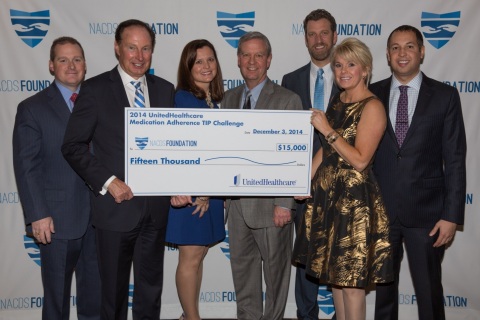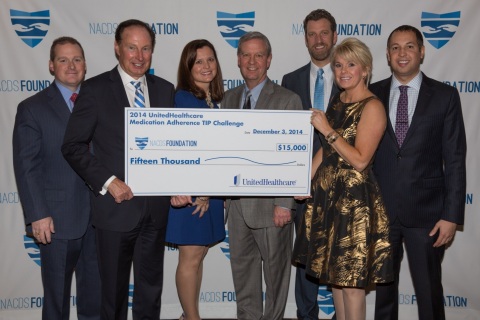MINNETONKA, Minn.--(BUSINESS WIRE)--UnitedHealthcare announced the winners of the second annual UnitedHealthcare Medication Adherence Targeted Intervention Program (TIP®) Challenge benefiting the National Association of Chain Drug Stores (NACDS) Foundation. The company presented a $90,000 donation to the foundation on behalf of the winning pharmacies at the 16th annual NACDS Foundation Dinner in New York City earlier this month.
UnitedHealthcare created the challenge last year to recognize the pharmacies in its network that have been most successful at helping its Medicare Advantage-Part D plan members take their prescription medications appropriately, thereby helping to enhance their health and well-being.
The company donated $15,000 to the NACDS Foundation on behalf of each of the winning pharmacies – three in the large retail pharmacy chain category, and three in the small retail pharmacy chain and independent community pharmacy category.
The winning pharmacies in the large retail pharmacy chain category are:
- Giant Eagle
- Publix Super Markets, Inc.
- fred’s Pharmacies
The winning pharmacies in the small retail pharmacy chain and independent community pharmacy category are:
- Wegmans, Rochester, New York
- LI Script, West Babylon, New York
- Kohll’s Pharmacies, Omaha, Nebraska
The 2014 UnitedHealthcare Medication Adherence TIP® Challenge winners markedly improved medication adherence among a group of UnitedHealthcare Medicare Advantage-Part D plan members.
Using its analytics, UnitedHealthcare identified members who were at risk for medication non-adherence and then notified the participating pharmacies of those customers who could benefit from pharmacists’ medication therapy management services. For example, customers with a pattern of not filling prescriptions or picking up refills were flagged for the participating pharmacies. Pharmacists then worked with these customers through one-on-one consultations to help address their individual barriers to medication adherence, such as cost of their medications, memory problems that cause patients to forget to take their medications, or confusion related to the complexity of their medication regimens.
When appropriate, pharmacists also informed their customers’ physicians of opportunities to consider evidence-based therapy protocols that could benefit the customer. For example, pharmacists consulted with physicians when customers were using medications classified as high risk for treatment of seniors to determine if a new prescription for a safer alternative medication would be appropriate.
The pharmacies in each challenge category were ranked based on their customers’ medication adherence rates. The top three pharmacies in each category were recognized as the winners.
Through education, research and charitable involvement, the NACDS Foundation helps people improve their health and quality of life through an understanding of medication therapy and the importance of taking medications appropriately. The foundation strives to enhance patient care services in neighborhood pharmacies and the health care system at large by supporting research initiatives, scholarships for pharmacy students and continuing education programs that focus on patient-centered care in the community pharmacy setting.
“We are grateful for the generous donation from UnitedHealthcare,” said Kathleen Jaeger, president, NACDS Foundation. “Collaboration between health insurers and pharmacies is critical to improving medication adherence rates, particularly among seniors. Initiatives like the TIP Challenge are a unique and effective way to encourage that collaboration.”
According to the Pharmaceutical Research and Manufacturers of America, nearly 75 percent of adults do not take their medications as prescribed, which limits the drugs’ effectiveness, increases the risk of poor health outcomes and raises the overall cost of care.i Medication non-adherence is an especially significant issue among seniors, given that approximately 90 percent of adults over 60 take at least one prescription medication, and more than a third take five or more prescription drugs.ii
“Pharmacists often interact with their customers on a weekly and sometimes even a daily basis, making them a critically important part of Medicare beneficiaries’ health care team,” said Steve Nelson, CEO of UnitedHealthcare Medicare & Retirement. “We applaud the winning pharmacies in our Medication Adherence TIP Challenge and are honored to recognize their contributions to helping our members live healthier lives.”
Serving nearly one in five Medicare beneficiaries, UnitedHealthcare Medicare & Retirement is the largest business dedicated to meeting the health and well-being needs of seniors and other beneficiaries. The company is the market leader in Medicare Advantage plans, Part D prescription drug plans and Medicare supplement plans.iii
About UnitedHealthcare
UnitedHealthcare is dedicated to helping people nationwide live healthier lives by simplifying the health care experience, meeting consumer health and wellness needs, and sustaining trusted relationships with care providers. The company offers the full spectrum of health benefit programs for individuals, employers, military service members, retirees and their families, and Medicare and Medicaid beneficiaries, and contracts directly with more than 800,000 physicians and care professionals, and 6,000 hospitals and other care facilities nationwide.vi Globally, UnitedHealthcare serves 45 million people in health benefits and is one of the businesses of UnitedHealth Group (NYSE: UNH), a diversified Fortune 50 health and well-being company.v For more information, visit UnitedHealthcare at www.uhc.com or follow @myUHC on Twitter.
i Improving Prescription Medicine Adherence is Key to Better
Health Care, PhRMA, January 2011 http://phrma.org/sites/default/files/pdf/PhRMA_Improving%20Medication%20Adherence_Issue%20Brief.pdf
ii
Prescription Drug Use Continues to Increase: U.S. Prescription Drug Data
for 2007-2008, National Center for Health Statistics, U.S. Centers for
Disease Control and Prevention http://www.cdc.gov/nchs/data/databriefs/db42.htm
iii
Internal UnitedHealthcare Data, 2014
iv Internal
UnitedHealthcare Data, 2014
v Internal UnitedHealthcare
Data, 2014




